
QWorld Quantum Science Days 2021 | June 1-2, Online
QWorld Quantum Science Days 2021 (QSD 2021) is the first scientific meeting organized by QWorld (Association) to provide opportunities to the quantum community to present and discuss their research results at all levels (from short projects to thesis work to research publications), and to get to know each other.
The event is held online by using a Discord server and Zoom meetings between 10:00 and 18:00 (GMT/UTC) on June 1-2, 2021.
Our program consists of 5 invited talks, 26 contributed talks, a dedicated session on QWorld’s research activities.
See the recordings of the event on our playlist >>
There is no registration fee, but the registration is mandatory and should be completed by 20:00 (GMT), May 31, 2021.
Committees | Code of Conduct | contact: qsd2021@qworld.net
Program
JUNE 1
Session 1 (Abuzer Yakaryilmaz)
10:00 (GMT) | Opening
10:05 (GMT) | James Wootton, Quantum procedural generation
11:00 (GMT) | Stephen Z. D. Plachta, Multi-qubit quantum finite automata using structured photons (21)
11:20 (GMT) | Utku Birkan, Implementing quantum finite automata algorithms on noisy devices (19, QIntern)
11:40 (GMT) | Aurél Gábris, Tunable trade-off between quantum and classical computation via non-unitary Zeno-like dynamics (10)
12:00 (GMT) | Shubhayan Sarkar, Universal notion of classicality based on ontological framework (17)
12:20 – 12:50 | Break (30 min.)
Session 2 (Aeysha Khalique & Sumeet Khatri)
12:50 (GMT) | Zoltán Zimborás, Introducing QResearch (27)
13:10 (GMT) | Zeki Seskir, The landscape of academic literature in quantum technologies (1)
13:30 (GMT) | Özlem Salehi, A computer science-oriented approach to introduce quantum computing to a new audience (11, QIntern)
13:50 (GMT) | Marija Šćekić, Comparing quantum software development kits for introductory level education (25)
14:10 (GMT) | Zeynep Pelin Yıldırım & Samantha van Rijs, Physical analysis of quantum circuits using python (14, QIntern)
14:30 (GMT) | Hossein Davoodi Yeganeh, Hybrid quantum variational algorithm for simulating open quantum systems with near-term devices (2)
14:50 (GMT) | Adam Glos, Space-efficient binary optimization for variational computing (13)
15:10 – 15:40 | Break (30 min.)
Session 3 (Sumeet Khatri & Aeysha Khalique)
15:40 (GMT) | Ludmila Botelho, Infeasible space reduction for QAOA through encoding change (20)
16:00 (GMT) | Alba Cervera Lierta, The meta-variational quantum eigensolver
17:00 (GMT) | Barry Sanders, Quantum computing for data science
JUNE 2
Session 1 (Zoltán Zimborás)
10:00 (GMT) | Tracy E. Northup, Quantum networks based on trapped-ion quantum computers
11:00 (GMT) | Neel Kanth Kundu, MIMO Terahertz quantum key distribution (6)
11:20 (GMT) | Máté Farkas, Bell nonlocality is not sufficient for the security of standard device-independent quantum key distribution protocols (15)
11:40 (GMT) | Shashank Gupta, Sequential sharing of genuine EPR steering by multiple observers (7)
12:00 (GMT) | Zoltán Guba, Resource analysis for quantum-aided Byzantine agreement (9, QIntern)
12:20 – 12:50 | Break (30 min.)
Session 2 (Andras Palyi)
12:50 (GMT) | Menno Veldhorst, Quantum information processing with semiconductor technology: from qubits to integrated quantum circuits
13:50 (GMT) | Irina Heinz, Crosstalk analysis for single-qubit and two-qubit gates in spin qubit arrays (12)
14:10 (GMT) | Jonas Mielke, Nuclear spin readout in a cavity-coupled hybrid quantum dot-donor system (16)
14:30 (GMT) | Daniel Jirovec, A singlet triplet hole spin qubit in planar Ge (8)
14:50 (GMT) | Florian Ginzel, Spin shuttling in a silicon double quantum dot (4)
15:10 – 15:40 | Break (30 min.)
Session 3 (Ilke Ercan)
15:40 (GMT) | Philipp M. Mutter, Natural heavy-hole flopping mode qubit in germanium (3)
16:00 (GMT) | Donny Dwiputra, Driving-assisted open quantum transport in qubit networks (26)
16:20 (GMT) | Pavlo Pyshkin, Polaron formation in a spin chain by measurement-induced imaginary Zeeman field (5)
16:40 (GMT) | Amin Hosseinkhani, Switching between relaxation hotspots and coldspots in disordered spin qubits (18)
17:00 (GMT) | Niklas Rohling, Quantum state tomography as a numerical optimization problem (22)
17:20 (GMT) | Akos Budai, Cheap readout error mitigation on expensive NISQ devices (23)
17:40 (GMT) | Zoltán Zimborás, Fermion sampling: a robust quantum computational advantage scheme using fermionic linear optics and magic input states (24)
Invited speakers
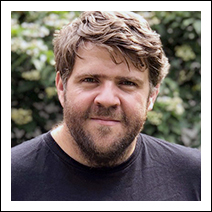
James Wootton (IBM Zurich) | 10:00 (GMT), June 1, 2021
Title: Quantum procedural generation
See the recording of the talk on YouTube >>
Abstract:
Quantum computation is an emerging technology that promises to be a powerful tool in many areas. Though some years likely still remain until significant quantum advantage is demonstrated, the development of the technology has led to a range of valuable resources. These include publicly available prototype quantum hardware, advanced simulators for small quantum programs and programming frameworks to test and develop quantum software. In this talk we show that these resources are sufficient to provide the first useful results in the field of procedural generation [1,2].
Ref:
[1] https://dl.acm.org/doi/10.1145/3402942.3409600
[2] https://ieeexplore.ieee.org/document/9231571
Dr. James Wootton is part of IBM Quantum, based at IBM Research – Zurich. He has worked for over a decade on quantum error correction, and has also been involved in multiple educational and outreach activities. He now focusses on helping people new to the field of quantum computing tackle interesting research questions.
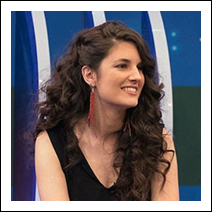
Alba Cervera Lierta (University of Toronto) | 16:00 (GMT), June 1, 2021
Title: The meta-variational quantum eigensolver
See the recording of the talk on YouTube >>
Abstract:
In this talk, I will present the meta-VQE, an algorithm capable to learn the ground state energy profile of a parametrized Hamiltonian. By training the meta-VQE with a few data points, it delivers an initial circuit parametrization that can be used to compute the ground state energy of any parametrization of the Hamiltonian within a certain trust region. We test this algorithm with a XXZ spin chain, an electronic H4 Hamiltonian and a single-transmon quantum simulation. In all cases, the meta-VQE is able to learn the shape of the energy functional and, in some cases, resulted in improved accuracy in comparison to individual VQE optimization. The meta-VQE algorithm introduces both a gain in efficiency for parametrized Hamiltonians, in terms of the number of optimizations, and a good starting point for the quantum circuit parameters for individual optimizations. The proposed algorithm can be readily mixed with other improvements in the field of variational algorithms to shorten the distance between the current state-of-the-art and applications with quantum advantage. I will also review the features of Tequila, a quantum software package for the rapid development of quantum algorithms.
Ref:
https://arxiv.org/abs/2009.13545 (Meta-VQE),
https://iopscience.iop.org/article/10.1088/2058-9565/abe567 (Tequila paper),
https://github.com/aspuru-guzik-group/tequila (Tequila),
https://github.com/aspuru-guzik-group/tequila-tutorials (tequila tutorials),
https://arxiv.org/abs/2101.08448 (NISQ review)
Alba Cervera-Lierta did her PhD at the University of Barcelona, where she studied a physics degree and an MSc in particle physics. Her background is quantum information, multipartite entanglement and quantum computation. She is currently a Postdoctoral fellow at the MatterLab (Alán Aspuru-Guzik group) at the University of Toronto. She currently works on near-term quantum algorithms, the development of computational tools for quantum computation and high-dimensional quantum physics.
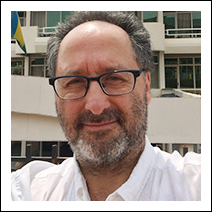
Barry Sanders (University of Calgary) | 17:00 (GMT), June 1, 2021
Title: Quantum computing for data science
See the recording of the talk on YouTube >>
Abstract:
I provide a perspective on the development of quantum computing for data science, including a dive into state-of-the-art for both hardware and algorithms.
Barry Sanders is a professor and Director of the Institute for Quantum Science and Technology at the University of Calgary, Lead of the Quantum Alberta consortium, part-time Distinguished Professor at the University of Science and Technology of China and part-time VAJRA professor at the Raman Research Instiute in India. He is a Fellow of the Royal Society of Canada, of the Institute of Physics, of the American Physical Society and of the Optical Society of America.
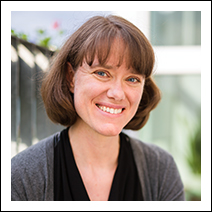
Tracy E. Northup (University of Innsbruck) | 10:00 (GMT), June 2, 2021
Title: Quantum networks based on trapped-ion quantum computers
See the recording of the talk on YouTube >>
Abstract:
Entanglement-based quantum networks hold out the promise of new capabilities for secure communication, distributed quantum computing, and interconnected quantum sensors [1,2]. However, only a handful of elementary quantum networks have been realized to date. Trapped ions are among the most promising platforms for quantum information science, and I will review the state of the art in linking together trapped-ion quantum computers [3-5]. Optical cavities provide efficient quantum interfaces between ions and photons [6-9]; I will present ongoing work to link two cavity-coupled ion traps in Innsbruck across a 400 m fiber channel. We will then consider how to extend such links to multi-node networks.
Ref:
[1] H. J. Kimble, Nature 453, 1023 (2008)
[2] S. Wehner, D. Elkouss, and R. Hanson, Science 362, eaam9288 (2018)
[3] D. L. Moehring, P. Maunz, S. Olmschenk, K. C. Younge, D. N. Matsukevich, L.-M. Duan, and C. Monroe, Nature 449, 68 (2007)
[4] D. Hucul, I. V. Inlek, G. Vittorini, C. Crocker, S. Debnath, S. M. Clark, and C. Monroe, Nat. Phys. 11, 37 (2015)
[5] L. J. Stephenson, D. P. Nadlinger, B. C. Nichol, S. An, P. Drmota, T. G. Ballance, K. Thirumalai, J. F. Goodwin, D. M. Lucas, and C. J. Ballance, High-Rate, Phys. Rev. Lett. 124, 110501 (2020)
[6] A. Stute, B. Casabone, P. Schindler, T. Monz, P. O. Schmidt, B. Brandstätter, T. E. Northup, and R. Blatt, Nature 485, 482 (2012)
[7] B. Casabone, K. Friebe, B. Brandstätter, K. Schüppert, R. Blatt, and T. E. Northup, Phys. Rev. Lett. 114, 023602 (2015)
[8] M. Meraner, A. Mazloom, V. Krutyanskiy, V. Krcmarsky, J. Schupp, D. Fioretto, P. Sekatski, T. E. Northup, N. Sangouard, and B. P. Lanyon, Phys. Rev. A 102, 052614 (2020)
[9] J. Schupp, V. Krcmarsky, V. Krutyanskiy, M. Meraner, T. E. Northup, and B. P. Lanyon, arXiv:2105.02121 (2021)
Tracy Northup is the Ingeborg Hochmair Professor of Experimental Physics at the University of Innsbruck, Austria. Her research explores quantum interfaces between light and matter, focusing on trapped-ion and cavity-based interfaces for quantum networks and quantum optomechanics. She received her PhD from the California Institute of Technology in 2008 and then held an appointment as a postdoctoral scholar at the University of Innsbruck, where she was the recipient of a Marie Curie International Incoming Fellowship and an Elise Richter Fellowship. She became an assistant professor at the University of Innsbruck in 2015 and has been a full professor since 2017. In 2016, she received the START Prize, the highest Austrian award for young scientists, from the Austrian Science Fund.
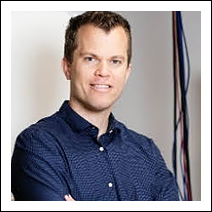
Menno Veldhorst (QuTech and Kavli Institute of Nanoscience) | 12:50 (GMT), June 2, 2021
Title: Quantum information processing with semiconductor technology: from qubits to integrated quantum circuits
See the recording of the talk on YouTube >>
Abstract:
Our approach toward scalable quantum technology departs from the transistor, the most replicated structure made by mankind [1,2]. We define qubits on the spin states of electrons and holes in silicon and germanium quantum dots. In this talk I will present our recent results in increasing the qubit quality and quantity. First, we show that even a single hole can be coherently controlled [3]. By exploiting the strong spin-orbit interaction of holes we obtain fast qubit operation with gate fidelities of 99.99%, setting new benchmarks for quantum dot systems. Furthermore, through dynamical decoupling we obtain record coherence times for holes and by applying this technique as a band filter we are able to measure the transversal hyperfine interaction with nuclear spins. Second, we demonstrate that quantum dot qubits and control electronics can be operated in the same temperature regime [4,5]. In addition, we show that qubits can be realized using a fully-industrial 300 mm wafer process. These together define a key step toward integrated quantum circuits [1]. Third, we construct a 2×2 quantum dot array and show qubit coupling in two dimensions [6,7]. We obtain universal control and demonstrate coherent execution of a quantum circuit that entangles and disentangles all four qubits. Finally, I will present our strategies to overcome qubit-to-qubit variations, aiming to build quantum systems with fewer control lines than number of qubits [8], targeting to achieve a quantum advantage with the same materials and techniques that enabled todays information age.
Ref:
[1] Vandersypen et al. npj Quantum Information 2017
[2] Scappucci et al. Nature Reviews Materials 2020
[3] Hendrickx et al. Nature Communications 2020
[4] Petit et al. Nature 2020
[5] Xue et al. Nature 2021
[6] van Riggelen et al. APL 2021
[7] Hendrickx et al. Nature 2021
[8] Li et al. Science Advances 2018
Menno Veldhorst is group leader at QuTech, the lead of the QuTech Academy, and portfolio director at the extension school of the TU Delft. Veldhorst received his PhD cum laude at the University of Twente (in the groups of prof. A. Brinkman and prof. H. Hilgenkamp). He performed his postdoctoral research at the University of New South Wales in the group of prof. A. Dzurak, where he demonstrated single and two-qubit logic in silicon, mentioned as one of the top ten breakthroughs in physics in 2015 by Physics World. His group at QuTech introduced planar germanium qubits, demonstrated universal logic with silicon above one Kelvin, and realized four-qubit logic with quantum dots. He has published more than 60 papers, including 18 publications in the Science and Nature journals. For his contributions to silicon and germanium quantum technology he received the Nicholas Kurti Science Prize and he is listed as a visionary in the MIT Technology Review list 35 innovators under 35. As lead QuTech Academy, Veldhorst develops massive online courses (MOOCs) on quantum technology, which have attracted already over 80.000 students.
List of Talks
[In their submitted order]
- The landscape of academic literature in quantum technologies
Zeki Seskir* (METU Physics Department)
See the recording of the talk on YouTube >> - Hybrid quantum variational algorithm for simulating open quantum systems with near-term devices
Mahmoud Mahdian and Hossein Davoodi Yeganeh* (University of Tabriz)
See the recording of the talk on YouTube >> - Natural heavy-hole flopping mode qubit in germanium
Philipp M. Mutter* and Guido Burkard (University of Konstanz) - Spin shuttling in a silicon double quantum dot
Florian Ginzel*, Adam R. Mills, Jason R. Petta, and Guido Burkard (University of Konstanz; Princeton University)
See the recording of the talk on YouTube >> - Polaron formation in a spin chain by measurement-induced imaginary Zeeman field
Pavlo Pyshkin*, E. Ya. Sherman, and Lian-Ao Wu (University of the Basque Country)
See the recording of the talk on YouTube >> - MIMO Terahertz quantum key distribution
Neel Kanth Kundu*, Soumya P. Dash, Matthew R. McKay, and Ranjan K. Mallik (The Hong Kong University of Science and Technology; Indian Institute of Technology Bhubaneswar; Indian Institute of Technology Delhi)
See the recording of the talk on YouTube >> - Sequential sharing of genuine EPR steering by multiple observers
Shashank Gupta (S. N. Bose National Centre for Basic Sciences) - A singlet triplet hole spin qubit in planar Ge
Daniel Jirovec* (IST Austria) et al.
See the recording of the talk on YouTube >> - Resource analysis for quantum-aided Byzantine agreement
Zoltán Guba*, István Finta, Ákos Budai, Lóránt Farkas, Zoltán Zimborás, and András Pályi (Budapest University of Technology and Economics; Nokia Bell Labs; Óbuda University; Wigner Research Centre for Physics)
See the recording of the talk on YouTube >> - Tunable trade-off between quantum and classical computation via non-unitary Zeno-like dynamics
Pavlo V. Pyshkin, Aurél Gábris*, Da-Wei Luo, Jian-Qiang You, and Lian-Ao Wu (University of the Basque Country; Czech Technical University in Prague; Wigner Research Centre for Physics; Stevens Institute of Technology; Zhejiang University; Basque Foundation for Science)
See the recording of the talk on YouTube >> - A Computer Science-Oriented Approach to Introduce Quantum Computing to a New Audience
Özlem Salehi*, Zeki Seskir, and İlknur Tepe (IITiS PAN; METU Physics Department; QWorld)
See the recording of the talk on YouTube >> - Crosstalk analysis for single-qubit and two-qubit gates in spin qubit arrays
Irina Heinz* and Guido Burkard (University of Konstanz)
See the recording of the talk on YouTube >> - Space-efficient binary optimization for variational computing
Adam Glos*, Aleksandra Krawiec, and Zoltan Zimboras (Polish Academy of Sciences; Wigner Research Centre for Physics; BME-MTA Lendulet Quantum Information Theory Research Group)
See the recording of the talk on YouTube >> - Physical analysis of quantum circuits using python
Zeynep Pelin Yıldırım*, Ahmed Asaf Toprakçı, Samantha van Rijs*, and İlke Ercan (Boğaziçi University; Bilkent University; Technical University of Delft)
See the recording of the talk on YouTube >> - Bell nonlocality is not sufficient for the security of standard device-independent quantum key distribution protocols
Máté Farkas*, Maria Balanzó-Juandó, Karol Łukanowski, Jan Kołodyński, and Antonio Acín (ICFO)
See the recording of the talk on YouTube >> - Nuclear spin readout in a cavity-coupled hybrid quantum dot-donor system
Jonas Mielke*, Jason R. Petta, and Guido Burkard (University of Konstanz)
See the recording of the talk on YouTube >> - Universal notion of classicality based on ontological framework
Shubhayan Sarkar* (Center for Theoretical Physics of the Polish Academy of Sciences)
See the recording of the talk on YouTube >> - Switching between relaxation hotspots and coldspots in disordered spin qubits
Amin Hosseinkhani* and Guido Burkard (University of Konstanz)
See the recording of the talk on YouTube >> - Implementing quantum finite automata algorithms on noisy devices
Utku Birkan*, Özlem Salehi, Viktor Olejar, Cem Nurlu, and Abuzer Yakaryılmaz (Middle East Technical University; Özyeğin University; P.J. Šafárik University in Košice; Boğaziçi University; University of Latvia; QWorld)
See the recording of the talk on YouTube >> - Infeasible space reduction for QAOA through encoding change
Ludmila Botelho*, Adam Glos, Akash Kundu, Jarosław Adam Miszczak, Ozlem Salehi, and Zoltan Zimboras (Polish Academy of Sciences; Wigner Research Center for Physics; BME-MTA Lendulet Quantum Information Theory Research Group)
See the recording of the talk on YouTube >> - Multi-qubit quantum finite automata using structured photons
Stephen Z. D. Plachta*, Markus Hiekkamäki, Abuzer Yakaryılmaz, and Robert Fickler (Tampere University; University of Latvia; QWorld)
See the recording of the talk on YouTube >> - Quantum state tomography as a numerical optimization problem
Violeta N. Ivanova-Rohling, Guido Burkard, and Niklas Rohling* (University of Konstanz; Bulgarian Academy of Sciences)
See the recording of the talk on YouTube >> - Cheap readout error mitigation on expensive NISQ devices
Akos Budai*, Zoltan Zimboras, and Andras Palyi (Budapest University of Technology and Economics; Hungary Academy of Sciences; Nokia Bell Labs)
See the recording of the talk on YouTube >> - Fermion sampling: a robust quantum computational advantage scheme using fermionic linear optics and magic input states
Michał Oszmaniec, Ninnat Dangniam, Mauro E.S. Morales, and Zoltán Zimborás* (Polish Academy of Sciences; University of Technology Sydney; Wigner Research Centre for Physics; MTA-BME Lendulet Quantum Information Theory Research Group; Budapest University of Technology and Economics)
See the recording of the talk on YouTube >> - Comparing quantum software development kits for introductory level education
Marija Šćekić* and Abuzer Yakaryılmaz (Mediterranean University; University of Latvia; QWorld)
See the recording of the talk on YouTube >> - Driving-assisted open quantum transport in qubit networks
Donny Dwiputra*, Jusak S. Kosasih, Albertus Sulaiman, and Freddy P. Zen (Institut Teknologi Bandung; Indonesian Center for Theoretical and Mathematical Physics; Badan Pengkajian dan Penerapan Teknologi)
See the recording of the talk on YouTube >> - Introducing QResearch
Zoltán Zimborás* and Adam Glos (QWorld)
See the recording of the talk on YouTube >>
Call for contributed talks
Scope: All aspects of quantum information science and technology.
We welcome contributed talk submissions reporting on original research results, as well as reporting on internship projects (e.g, QIntern 2020), ongoing and completed BSc and MSc thesis works, and open-source software. We also welcome tutorials and outreach talks. As many talks as possible will be selected for oral presentations. There will be no poster session. Previously published or presented talks, preferable recent ones, are welcome to be submitted.
There will be an abstract booklet available to the participants before the meeting.
Submissions were closed on May 20, 2021.
Submit your work by filling the following Google form, and (i) either upload a manuscript or an extended abstract of around two pages through the form (ii) or provide a link (e.g., arXiv or DOI) to your (published) work.
Committees
Program committee
Ilke Ercan (TU Delft)
Aeysha Khalique (QPakistan & National University of Sciences and Technology, Islamabad)
Sumeet Khatri, co-chair (Louisiana State University)
Andras Palyi (QHungary & Budapest University of Technology and Economics)
Abuzer Yakaryilmaz, co-chair (QWorld & University of Latvia)
Organizing committee
Andrei Voicu Tomut (QRomania)
Agnieszka Wolska (QWorld)
Abuzer Yakaryilmaz, chair (QWorld & University of Latvia)
| Yakaryılmaz is partially supported by ERDF project Nr. 1.1.1.5/19/A/005 “Quantum computers with constant memory”. |  |
Code of conduct
Based on the codes of conduct by Geek Feminism Wiki & TQC.
Our event is dedicated to providing a harassment-free meeting experience for everyone, regardless of gender, gender identity and expression, sexual orientation, disability, physical appearance, body size, race, age or religion. We do not tolerate harassment of event participants in any form. Sexual language and imagery is not appropriate for any event venue, including talks. Event participants violating these rules may be sanctioned or expelled from the workshop at the discretion of the workshop organizers.
Harassment includes, but is not limited to:
- Offensive comments related to gender, gender identity and expression, sexual orientation, disability, physical appearance, body size, race, age, religion.
- Sexual images in public spaces
- Deliberate intimidation, stalking, or following
- Harassing photography or recording
- Sustained disruption of talks or other events
- Inappropriate physical contact
- Unwelcome sexual attention
- Advocating for, or encouraging, any of the above behavior
- Participants asked to stop any harassing behavior are expected to comply immediately.
If a participant engages in harassing behavior, event organizers retain the right to take any actions to keep the meeting a welcoming environment for all participants. This includes warning the offender or expulsion from the event.
Event organizers may take action to redress anything designed to, or with the clear impact of, disrupting the event or making the environment hostile for any participants.
We expect participants to follow these rules at all event venues and event-related social activities. We think people should follow these rules outside event activities too!
Reporting
If someone makes you or anyone else feel unsafe or unwelcome, please report it as soon as possible. Harassment and other code of conduct violations reduce the value of our event for everyone. We want you to be happy at our event. People like you make our event a better place.
You can make a personal report by contacting any of the organizers.
Our team will be happy to help you to feel safe for the duration of the event. We value your attendance.
